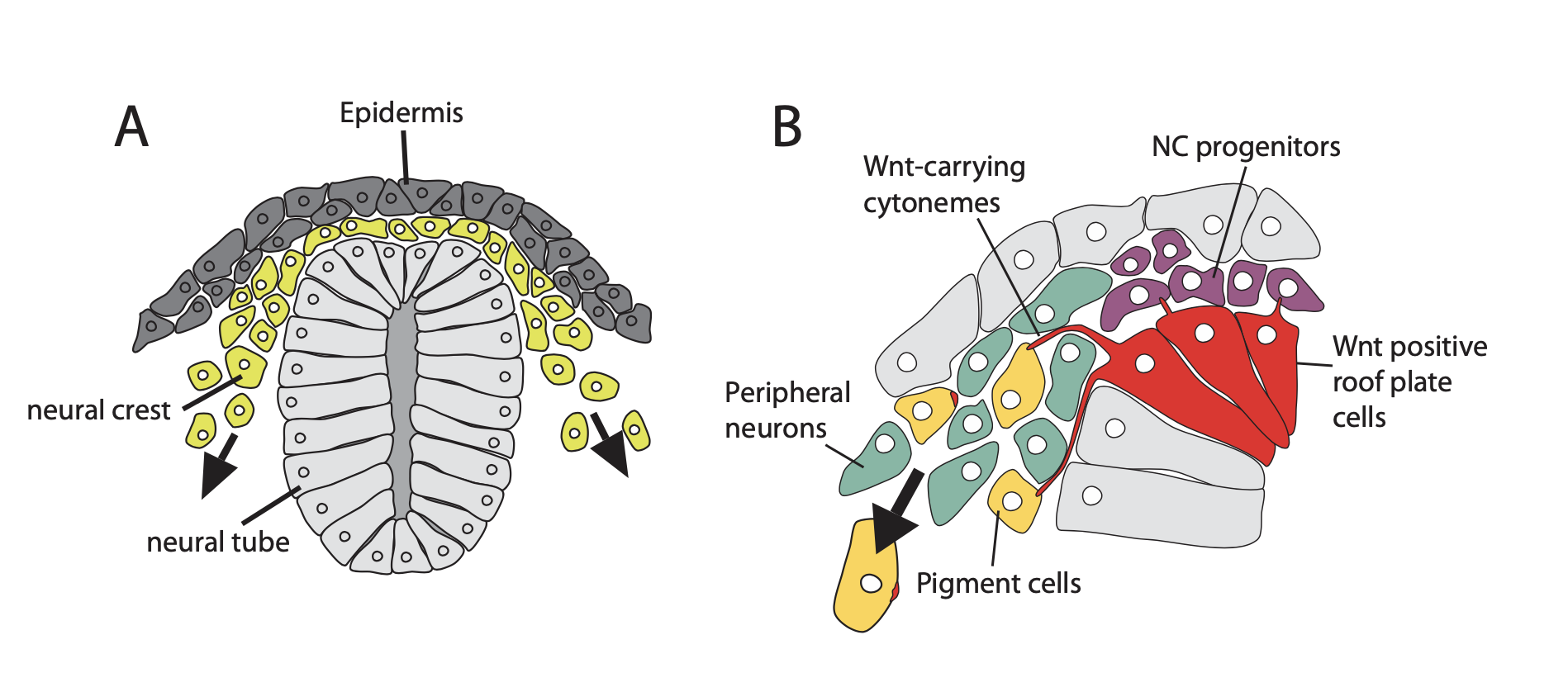BBSRC PhD position: Wnt signalling in neural crest development.
Posted by Steffen Scholpp, on 22 November 2019
Closing Date: 15 March 2021
A BBSRC-funded PhD studentship is available for a joint project between the labs of Steffen Scholpp, Living Systems Institute, University of Exeter (s.scholpp@exeter.ac.uk) and Robert Kelsh, University of Bath (bssrnk@bath.ac.uk).
Dissecting the function of Wnt signalling in zebrafish neural crest development.
Project Description
The neural crest (NC) is a stem-cell-like cell population, which is unique to vertebrates. NC cells can become peripheral neurons and glia, pigment cells and cartilage. NC cells migrate a long distance from their birthplace to the site where they function (Fig. 1A). Along the way, NC cells are exposed to signals promoting the variety of cell fates. We have shown that Wnt signals regulate the balance between peripheral neurons and pigment cells (Vibert et al., 2017 Pigm Cell Melanoma). However, how Wnt activates pigment cell fate, and leaving others to adopt another fate, is not understood. Recently, we could show that Wnt transport is directed by long cellular extensions called cytonemes. (Stanganello et al., 2015; Nat Comms). The producing cell loads Wnt on cytonemes to send them to the receiving cell. So, the producers can control how much and how far Wnt is transported, but also which cells are contacted. We hypothesise that Wnt cytonemes are the underlying cellular mechanism driving diversification of the NC lineage (Fig. 1B).
Under the supervision of leading cell biologists in Exeter and Bath, the student will test this hypothesis by studying Wnt transport in zebrafish. The student will generate transgenic zebrafish lines with fluorescently tagged Wnt proteins. The student will use these fish lines to monitor Wnt trafficking by advanced high- and super-resolution microscopy. Simultaneously signal activation in the receiving neural crest cells will be described by using real-time PCR, and live reporter systems. Finally, the student will interfere with Wnt cytonemes by using chemical inhibitors and CRISPR-based mutations in zebrafish to study their impact on NC differentiation.
The student selected for this project will develop invaluable skill sets in experimental genetics, cell biology while also making a significant contribution to the development of and high-resolution in vivo imaging techniques. This combined skill set will make the candidate a highly desirable recruitment prospect for future academic and industrial employers.
The Living Systems Institute in Exeter and the Department of Biology in Bath, with complementary expertise in biosciences and high-resolution imaging, will be an optimal environment to conduct these doctoral training studies. We offer unique training opportunities for the PhD student as it allows the student to address critical problems in life sciences with state-of-the-art equipment in an interdisciplinary environment.
A fully-funded four-year SWBio DTP studentship will cover:
• a stipend* at the standard UKRI rate; currently £15,009 per annum for 2019-2020
• research and training costs
• tuition fees (at the standard UKRI rate)
• additional funds to support fieldwork, conferences and a 3-month internship
For more information:
And contact the supervisor team.
Deadline: Monday, January 06, 2020
Start: Monday, October 05, 2020


 (No Ratings Yet)
(No Ratings Yet)